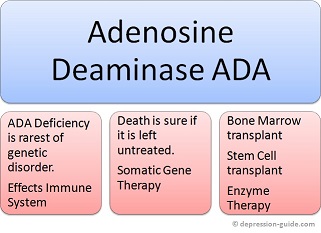Adenosine Deaminase ADA Deficiency
TweetAdenosine Deaminase Deficiency, commonly called ADA deficiency, is a very rare genetic disorder, documented as occurring in only a few dozen humans. This disease is also quite lethal, leading to death in virtually all those afflicted if not treated.
Adenosine Deaminase Deficiency - A severe immunodeficiency disease that results from a lack of the enzyme adenosine deaminase. It usually leads to death within the first few months of life.
The ADA gene codes for the enzyme Adenosine Deaminase which is essential for the proper functioning of the human body's immune system. People afflicted with this disease often have to live in a sheltered or enclosed environment, so that they're not exposed to infectious agents. One of the more commonly known cases of ADA deficiency was "The Boy in the Bubble" in which a little boy had to live his life in a enclosed bubble structure that shielded him from the outside world (Klug, Concepts of Genetics). ADA deficiency causes an increase of dATP, which inhibits S-adenosylhomocysteine hydrolase, causing an increase in S-adenosylhomocysteine. Both dATP and S-adenosylhomocysteine have toxic affects on lymphocytes, causing them to be functionally defective. The defective function is caused by a depletion of all of the dNTP pools. This causes a breakdown in DNA synthesis and repair of breaks occurring in the DNA.
Adenosine deaminase is deficient in one form of severe combined immune deficiency. The enzyme converts adenosine into inosine. This method measures the conversion of 14 C-adenosine into inosine. The substrates and products of the reaction are separated by chromatography on a thin layer plate. The analysis of the products is somewhat complicated by the potential of conversion of the product, inosine, into hypoxanthine by purine nucleoside phosphorylase. This is particularly noticeable if large amounts of enzyme activity are present in extracts. Extracts should be diluted and re-assayed if this problem occurs.
Inherited ADA deficiency causes a variable phenotypic spectrum, the most severe being SCID presenting in infancy and usually resulting in early death. Ten to 15% of patients have a 'delayed' clinical onset by age 6 to 24 months, and a smaller percentage of patients have 'later' onset, diagnosed from ages 4 years to adulthood, showing less severe infections and gradual immunologic deterioration. Finally, 'partial' ADA deficiency occurs in a subset of immunocompetent individuals who show decreased enzyme activity in erythrocytes, but retain substantial enzyme activity ranging from 5 to 80% of normal in leukocytes and other nucleated cells.

Adenosine Deaminase Deficiency and Depression
Dipeptidyl peptidase IV (DPPIV) and adenosine deaminase (ADA), two T cell associated enzymes, are known to have a possible interaction and play essential roles in immune system functioning. On the other hand, depression has been shown to be accompanied with some immune-inflammatory alterations. In this regard, in order to make a contribution to the understanding of the ongoing immune disturbances in depression, serum DPPIV and ADA activities were determined in minor and major depressives and compared with healthy controls. Both enzyme activities were found to be decreased in major depressives compared to controls while only DPPIV activity was significantly lower in major depressives than the minor depressives. There were significant inverse relationships between enzyme activities and the severity of depression. Moreover, a positive intracorrelation was found between decreased DPPIV and ADA levels. The correlated decrease in DPPIV and ADA, might be a further support for their possible association. Results also suggest that decreased enzyme activities might reflect the impaired immune state in depression while major depressed patients might have a greater tendency to immune dysfunction than the minor depressed ones.
Treatment of ADA deficiency is possible through 3 main routes:
- Bone marrow or stem cell transplants from a haploidentical donor is available for a minority of patients.
- Enzyme therapy can directly add missing ADA. This can occur through a transfusion of irradiated red blood cells. Patients on this regime experienced equally depressed antibody responses as untreated ADA deficient patients. Direct enzyme injections are a better method of introducing ADA to the patient.
- Somatic gene therapy can create functional ADA + T cells.


Sometimes crying or laughing
are the only options left,
and laughing feels better right now.

Current Issue
 Self Help Leaflets Take the help of our self help leaflets or booklets. |
 The DG Magazine All about living with depression |












